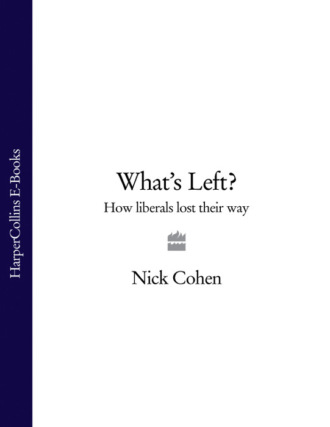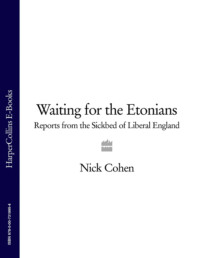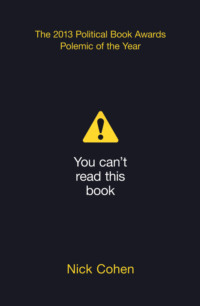
Полная версия
What's Left?: How Liberals Lost Their Way
For all the nihilism brought by the end of socialism and the exhaustion of the liberal agenda, you shouldn’t underestimate the advantages the absence of a principled political programme for liberals and leftists brings. Their philosophy – or lack of a philosophy – suits modern consumerism. You don’t have to commit to a vision of society and test it by standing for election. You don’t have comrades you are obliged to stick by when times are hard. Like a shopper walking through a mall, you have no loyalties and no duties and can breeze into any store that takes your fancy. All you must be is against your own Western government and against America. As your own government is going to be foolish and unjust at times, and as America naturally attracts resentment and suspicion because it is the world’s only superpower, and can also behave foolishly and unjustly at times, these are not high bars for the consumer of politics to jump.
Conservative readers could complain that I cite the indulgence for ideas and movements of the far right as the worst sin of today’s liberal-left. Why single out fascism when the far left is as bad as the far right? I accept that if you want to be an accountant about it and get your calculator out, left-wing dictators murdered many millions more than right-wing dictators did in the twentieth century. I also agree that what unites totalitarian movements is more important than what divides them. My case is simply that when liberal-minded people make excuses for a totalitarian right that they would once have considered taboo, a deep fever has taken hold.
What follows is a critical history of how the symptoms of the malaise began in obscure groups of Marxists and postmodern theorists; how the sickness manifested itself in the failure to confront genocide in the Middle East and Europe until it grew into the raging fever of our day. It is also an argument for recovering the best of the liberal-left’s democratic and internationalist traditions that have been neglected for too long.
A note on terminology
I use the Left as a generalization. It is not an exact term because it is very hard to say what it means, but you know the Left when you see it, and there were times when it felt like the right word. Overall, however, I try to be specific. The far left refers to the few remaining Leninists who still believe, or pretend to believe, that they can seize power and introduce a totalitarian state. If they stood alone, they wouldn’t be worth bothering with, but they have merged into a much wider and more incoherent alliance which has little to offer beyond a rootless rage. Academics, students, readers of and writers for most leftish newspapers and all but the bravest Muslim and poor world intellectuals share this group’s defining unwillingness to condemn crimes that can’t be blamed on the West. Occasionally I call them Chomskyans, after Noam Chomsky, the American linguist whose flighty behaviour I look at in Chapter 6. At other times, I call them nihilists because of their wilful refusal to put an agenda before the public. Because they don’t have a positive programme, it is difficult to think of a better label, although I accept that one is needed because they are the dominant left-wing force today.
A difference as large as the gulf between the democratic and totalitarian left is that between the working-class left, which generally fights for better pay and conditions, and the middle-class left which tends to be more interested in social and sexual liberalism. I call the trade unions and their supporters in the labour and social democratic parties the old left. For all the condescension directed at them, they are often the people who behave best in a crisis, as we shall see in Chapter 10. I call the middle-class left the liberals, not in the derogatory manner of American conservatives, but so I can talk about progressive middle-class opinion as a whole, and include Liberal Democrats in Britain, liberal-minded Christian Democrats and Gaullists in Europe and Democrats in the United States, as well as middle-class supporters of the labour and social democratic parties.
The one movement that I found very hard to classify is New Labour, which is probably why it won so many elections.
I use the liberal-left as a cover-all term for every shade of left opinion.
I accept that there are dozens of other tribes and traditions on the Left, but if I acknowledged them all I would lose you in a forest of footnotes. You can’t write clearly without generalizations, and these are mine.
PART ONE Morbid Symptoms
Yet it is a great mistake to suppose that the only writers who matter are those whom the educated in their saner moments can take seriously. There exists a subterranean world where pathological fantasies disguised as ideas are churned out by crooks and half-educated fanatics for the benefit of the ignorant and superstitious. There are times when this underworld emerges from the depths and suddenly fascinates, captures, and dominates multitudes of usually sane and responsible people, who thereupon take leave of sanity and responsibility.
Norman Cohn, 1996
Конец ознакомительного фрагмента.
Текст предоставлен ООО «ЛитРес».
Прочитайте эту книгу целиком, купив полную легальную версию на ЛитРес.
Безопасно оплатить книгу можно банковской картой Visa, MasterCard, Maestro, со счета мобильного телефона, с платежного терминала, в салоне МТС или Связной, через PayPal, WebMoney, Яндекс.Деньги, QIWI Кошелек, бонусными картами или другим удобным Вам способом.




